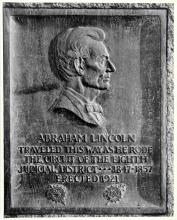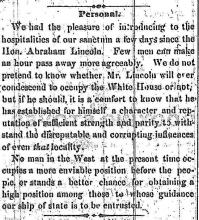 Abraham Lincoln’s birthday was this Sunday and next Monday is President’s Day, the national observance of Lincoln and George Washington’s births. Lincoln spent his early law career on the eighth judicial circuit, travelling with other lawyers and judges to try cases put before the court.
Abraham Lincoln’s birthday was this Sunday and next Monday is President’s Day, the national observance of Lincoln and George Washington’s births. Lincoln spent his early law career on the eighth judicial circuit, travelling with other lawyers and judges to try cases put before the court.
In 1845, he served as the court-ordered defense lawyer of William Weaver in Champaign County’s first murder trial. The case is 'dispassionately' described in J.R. Stewart’s A Standard History of Champaign County (1918):
[...] Weaver, a miserable, drunken, reckless wretch shot David Hiltibran [...] without any apparent motive, except the fiendish recklessness that often attends men who have become besotted [...] On the opening of the trial, Abraham Lincoln [...] and Asahel Gridley, were appointed by the court to defend the prisoner, but his guilt was too well established during the trial to admit of any verdict but “guilty,” and William Weaver was accordingly sentenced to be hung [...]
Weaver managed to escape prison before his execution, however. He reportedly absconded to Wisconsin where he changed his name and stayed on the straight and narrow. He was never recaptured.
Champaign County can boast other Lincoln firsts, as well. In the spring of 1859, Dr. John W. Scroggs, founder and editor of the Central Illinois Gazette, wrote two pieces about Lincoln. The first, published April 20, 1859, is the first known newspaper endorsement for Lincoln’s presidential qualifications. Most of the editorial is a scathing indictment of the feckless Republican party leaders, but towards the end is this passage about Lincoln (although it never explicitly names him):
[...] there are men [...] whose deeds are associated in the minds of millions with the very ideals of love of freedom and opposition to slavery; men whose names would ring to the ears of their fellow citizens as trumpet calls to the political battlefield. Who these men are it is not hard to tell for they are already the objects of bitter assaults of the enemy. We need not specify--there is a long line of giants, from the man who stood alone on the floor of the United States Senate, the only champion of free labor against the encroachments of the slave oligarchy, to the gallant son of Illinois who won so proud a wreath of laurels in the last senatorial campaign.

Weeks later the same publication wrote about Lincoln’s unflappable wholesomeness. It is difficult to determine where the moniker “Honest Abe” originated, though most accounts reference a miles-long walk to return six cents he overcharged a customer. Mary Todd Lincoln once wrote that her husband was “monomaniac on the subject of honesty.” This reputation was well-known in Champaign-Urbana’s editorial circles even before his bid for the presidency. Accordingly, this article from May 4,1859 indicates Lincoln’s unimpeachable nature would behoove him as the nation’s leader.
